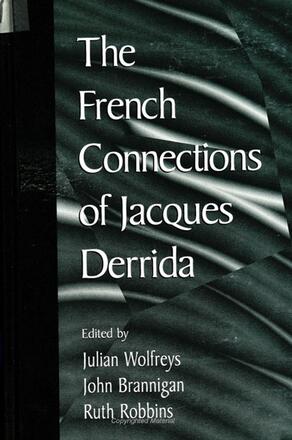
The French Connections of Jacques Derrida
Alternative formats available from:
Addresses for the first time the issue of Derrida's relation to French poetics, writing, thought, and culture.
Description
The French Connections of Jacques Derrida offers stimulating and accessible essays that address, for the first time, the issue of Derrida's relation to French poetics, writing, thought, and culture. In addition to offering considerations of Derrida through studies of such significant French authors as Mallarmé, Baudelaire, Valéry, Laporte, Ponge, Perec, Blanchot, and Barthes, the book also reassesses the development of Derrida's work in the context of structuralism, biology, and linguistics in the 1960s, and looks at the possible relationships between Derrida's writing and that of the Surrealist and Oulipa groups. Derrida is introduced as one whose work is as much poetic as it is philosophical, and who is strikingly French and yet not unproblematically so.
[Contributors include Boris Belay, John Brannigan, Christopher Johnson, John P. Leavey, Jr., Ian Maclachlan, Jessica Maynard, Laurent Milesi, Ruth Robbins, Michael Syrotinski, Michael Temple, Burhan Tufail, and Julian Wolfreys.]
Julian Wolfreys is the author of Being English, published by SUNY Press, and editor of The Derrida Reader: Writing Performances. John Brannigan is Lecturer in English and Head of Irish Studies at the University of Luton; he is also the editor (with Ruth Robbins and Julian Wolfreys) of Applying: to Derrida. Ruth Robbins is Lecturer in English at the University of Luton and has edited (with Julian Wolfreys) Victorian Identities.
Reviews
"This is a supple and thought-provoking book that caught my interest and kept it alive. It contributes a fresh understanding of Derrida's philosophy." — Jean-Michel Rabaté, University of Pennsylvania
"What a great topic: just the sort of background book that courses in contemporary poetics, French and other, might use. No one but Jacques Derrida has done such a stunning job of changing the way we see, think, read, and (don't we wish) write." — Mary Ann Caws, Graduate School, City University of New York